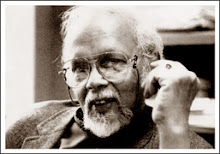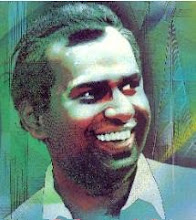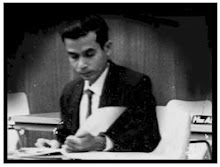Author: Jayanthi LIYANAGE Source: Daily News Date: 05/08/2009
French playwright Jean Anouilh’s stage play Colombe, translated and directed by Namel Weeramuni as Nattukkari, is scheduled to tread the boards the Namel Malini Punchi Theatre on August 13, 14, 15 and 16 at 6.30 p.m.
It was first staged in February 1970 at Havelock Town Theatre, now known as Lumbini, with a cast comprising Somalatha Subasinghe, Upali Attanayake, Dhamma Jagoda, Namel Weeramuni, Wickrema Bogoda, Prema Ganegoda, Malini Weramuni and Wimal Kumar de Costa among others. Later in 1976 October it was produced in London at Commonwealth Centre Theatre and Bernard Shaw Theatre at West End, with a change of cast.| |
The come back of the drama, produced by Namel-Malini Punchi Theatre, will be of yet another new cast and Namel Weeramuni shared with the Daily News his commendations and grievances of the present day Sri Lankan theatre. The show in London had been the first time ever a full length Lankan play had been done there.
“It is very unfortunate that people write about poetry, novels and short stories but no one writes about scripts,” Namel lamented, with the published Sinhala translation of Nattukkari in hand.
“Scripts must be encouraged because then only will people start publishing them.”
He has been addicted to the theatre for the last 52 years, beginning with acting in Prof. Ediriweera Sarathchandra’s play Rattaran and making quite a number of plays in the sixties. He is a product of the University of Ceylon, Peradeniya and had as his contemporaries personalities such as D.B. Peiris, Dr. Sarath Amunugama, J.B. Dissanayake, Wickrema Weerasuriya, Mervin De Silva and Phillip Cooray.
Namel moved on to graduate from Law College as an advocate and joined the Legal Draftsmen’s Department. A trip to Canada in 1973 on a three month scholarship and the subsequent delay in coming back due to an attempt to get his leave extended to stay in Washington and later in London had him deemed as vacating his post. 
“I decided to stay in London,” said Namel. “At that time, we had to get permission from the prime Minister to live abroad. I started doing odd jobs such as filling up shelves in supermarkets and working as a waiter.”
Later, he approached the Law Society in London and was exempted in all exam papers except one.
“But I needed to go through three years training as a clerk. I joined another Sri Lankan lawyer and worked as a solicitor. I had a lucrative practice with 41 people working for me.” He returned to Sri Lanka in 2002.
Namel did his Master degree program in theatre at the California State University and topped his batch, passing the nine papers he had to face with honours. His doctorate program, also in theatre, was done in Hawaii.
“Since 1959, I have been involved in theatre, acting, producing and directing my own plays and acting in other people’s plays.” His English translation of Prof. Sarathchandra’s Sinhabahu was staged in the States with an entirely American cast. It won a State Literary award for a Sinhala to English translation in 2000.
“When Nattukkari was staged in Ladies College Hall, the whole parliament was invited by Sam Wijesinghe to see the play and then prime minister Dudley Senanayake and Governor General William Gopallawa were among the audience.” Such political patronage is not there now, points out Namel.
His play Wansakkarayo, translation of Anouilh’s ‘Ardale’, produced in 1959 before he left the country, won the award for the best production at the Theatre Festival conducted by the Cultural department. While in University, he had produced Golu Birinda, an adaptation of Pro. Wimal Dissanayake who was one year junior to him. With Malini Weearamuni, he also produced an English Translation of Darmasena Pathiraja’s Kora saha Andaya (The Lame and the Blind).
Nattukkari, which is about a famous actress Alexandra, is believed to be the life of the great French actress Sarah Bernhardt.
“The play is about how an actress used to dominate theatre at that time. She was an actress who commanded an entire nation with respect and power. This is the situation in Sri Lanka too, due to television,” says Namel.
“When a play needs to be organized outstation, people want to know who the actors are. There was a time when people came to a play whoever the actors were. This is a menace created by television. People have been tuned into a world of fantasy like stars chosen in various TV channels.” He says that these stars charge a pay higher than even Amaradeva and this ironical situation is only prevalent in Sri Lanka.
“The appreciative power of the general masses has been reduced. Due to television, people from the great tradition have been brought down to the little tradition. There are shallow jokes and filthy language too. I believe there must be serious theatre here.”
In the new production of Nattukkari, the entire cast is drawn from TV and film stars.
“They are very popular. The people who went from stage are doing well in TV or film. People who are straight from TV are not that good because they don’t have the training.” Namel also points out that people who act in plays now want to join the TV and as such, the theatre is suffering. “They need to become famous over night. I have told them not go after publicity. Let publicity comes to you. We have lost a lot of potential in the theatre.” He says that the sixties and seventies were the golden era of theatre in Sri Lanka with the Bandaranaike government opening up a cultural change in 1956 and personalities such as Dayananda Gunewardena, Henry Jayasena, Gunasena Galappaththi, Dhamma Jagoda and Namel himself entering the arena.
“Their plays are the plays that are still running.” But there is a younger generation too that has come up, with names like Rajitha Dissanayake, Thumindu Dodantenna, Buddika Damayantha and Indika Fernandus keeping the theatre going. “Because of war, people became glued to the TV,” he says. “The quality of theatre has gone down. There are plays which come out as comedies but are weak and of low taste with four letter words of double meaning. They have changed the appreciative power of audiences.”
He acknowledges that there is a powerful English theatre in Sri Lanka.
“Now it is the English theatre in Sri Lanka that is surviving. In order to change that, we need to expand out audiences without which we cannot survive as an art form. Theatre needs to become an industry like the music industry. When a play is shown, there isn’t adequate discussion taking place of its merits and demerits. But our President gives an ear as he is a practical man.” Namel also comments that although theatre is a school subject from the seventh standard up to Advanced Level and all the Universities have drama courses, students do not go to see plays.
“They teach music and dancing which is not drama. After returning from the States, I went to the Art Faculty in Horana which has theatre as one of its subjects and asked the students what plays they had seen. One girl said she had seen three, Maname, Sinhabahu and Nari Bena. Another girl had seen two and yet another one. All the rest had never seen a play.
They pass out as graduates in theatre arts but what are they going to teach? They have to see not only the literary aspect, but also the practical aspect which is what we call theatre. This is not about going on stage and reading lines. You have to enact them, give life and meaning to the lines which is what we call theatricality.
You must hold the attention of your audiences and not bore them. The students must see plays and distinguish what is good from bad. A comparison must be there for you to understand scripts and develop taste or appreciative power. There must be critical analysis of plays,” he concluded.





































No comments:
Post a Comment